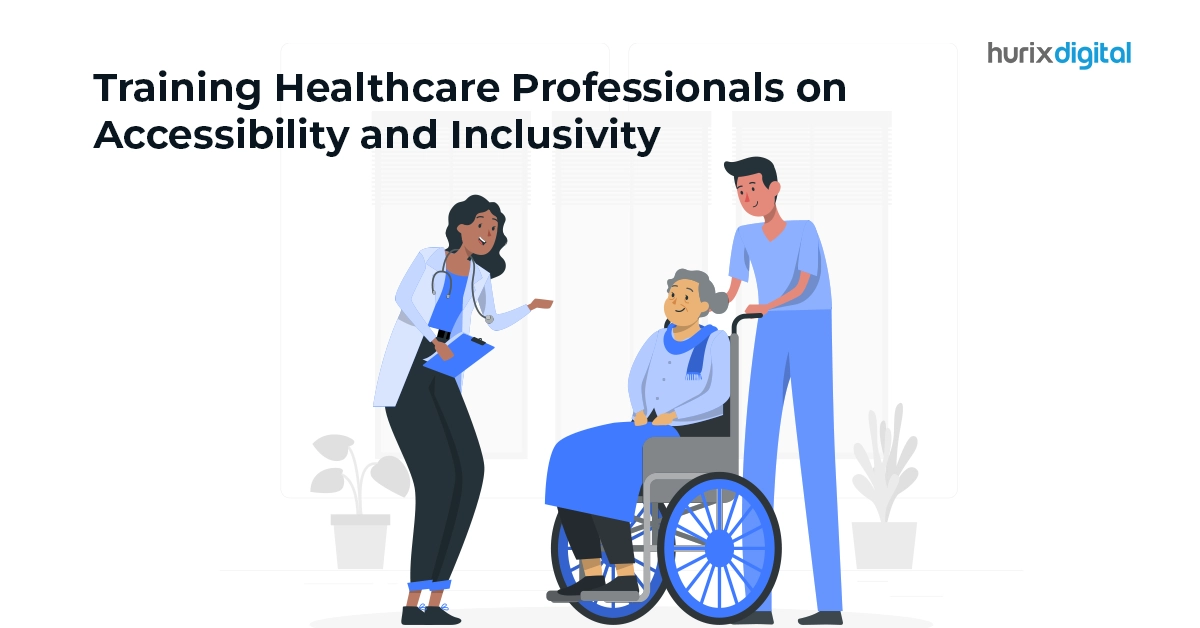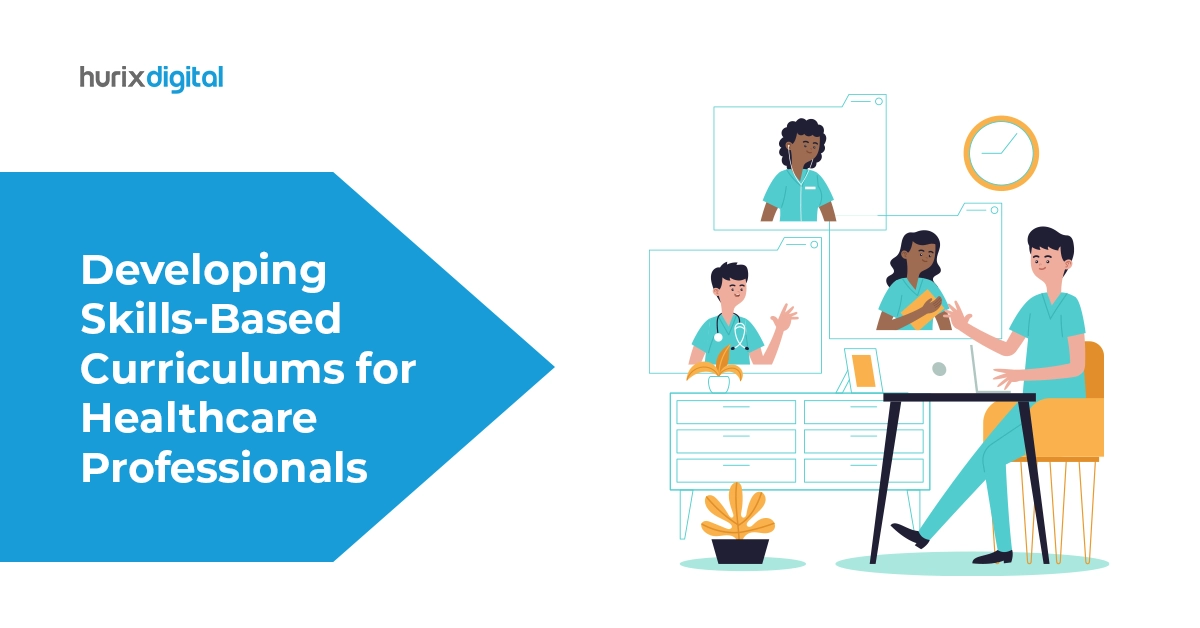
Training Healthcare Professionals on Accessibility and Inclusivity
Summary
Learn how to train healthcare professionals on accessibility and inclusivity. This blog provides strategies for ensuring healthcare workers are equipped to provide accessible care.
Healthcare is a fundamental requirement and a basic human right. Offering the best healthcare services is essential for the well-being of patients. Accessible and inclusive healthcare ensures that every person, irrespective of their physical, mental, or social circumstances, has the opportunity to lead a healthy life.
Today, disability affects an estimated 1.3 billion people globally, representing 16% of the world’s population, or 1 in 6 individuals. Shockingly, some with disabilities experience a lifespan of up to 20 years shorter than those without disabilities.
Dealing with patients facing disabilities can hinder healthcare experts in terms of performing certain activities. Therefore, it is imperative to prioritize disability care to enable individuals to live independently and with dignity.
Table of Contents:
- Relevance of Training Healthcare Professionals
- How to Initiate Effective Training for Healthcare Professionals
- Why is Training Healthcare Professionals Important?
- Promotes Equitable Care
- Fulfills Legal and Ethical Obligations
- Improves Patient Outcomes
- Enhances Communication
- Promotes Diversity and Inclusion
- Meets the Needs of an Aging Population
- Enhances Proficiency of Healthcare Professionals
- Prepares Caregivers Mentally
- Promotes a Secure and Supportive Healthcare Environment
- Conclusion
Relevance of Training Healthcare Professionals
Caring for individuals in healthcare organizations is a multifaceted challenge. Many require specialized care from both professional and voluntary healthcare professionals.
Healthcare professionals can offer invaluable assistance in various aspects of daily life. From routine tasks to complex needs, they can ensure the well-being of patients with special needs. There is no one-size-fits-all solution. Thus, the need of the hour is to train experts in the healthcare centers.
1. Initiatives for an accessible and inclusive healthcare system
- Governments should prioritize healthcare policies that enhance accessibility and inclusivity.
- Investing in health education initiatives empowers individuals to manage their well-being.
- Involving local communities in healthcare decision-making and effective healthcare solutions.
- Cultural competency and disability sensitivity training for healthcare professionals.
- One of the biggest obstacles encountered by inclusion and accessibility initiatives within healthcare organizations is the lack of awareness and sensitivity, especially toward the needs of individuals with special needs and disabilities.
Here is an overview of developing disability sensitivity training programs for healthcare organizations aiming to deliver quality care and nurture a positive work culture. Proper healthcare accessibility workshops and training programs should be initiated to sensitize healthcare professionals to encourage an inclusive and accessible healthcare environment.
2. What should healthcare professionals be trained on?
- Introduction of nursing care and non-medical therapies, by accessibility training resources along with specialized care.
- Collaboration and effective communication among healthcare experts is crucial for treating patients with diverse needs.
- It is essential for professionals to be familiar with the patient’s medical history, and to accompany them to all medical appointments.
- When making decisions, they must consider the specific circumstances of the patient.
- Caregivers should implement measures to mitigate physical symptoms and address the patient’s social, emotional, and spiritual needs.
3. Disability sensitivity training programs: Effective tips
- Avoid making assumptions and relying on stereotypes.
- Use appropriate terminology instead of labels.
- Employ inclusive language in all communications.
- Ensure that physical spaces are inclusive and accessible.
- Utilize inclusive and appropriate signage and symbols.
- Employ communication methods that accommodate diverse needs.
- Adopt a strength-based approach to caregiving.
- Ensure that healthcare service research considers inclusivity.
- Expand the scope of inclusive healthcare delivery.
- Educate oneself on diversity in all its forms.
Also Read: How to Create a Better Training Strategy for Your Healthcare Organization?
How to Initiate Effective Training for Healthcare Professionals
Here is a step-by-step procedure that will help healthcare organizations delve into effective disability sensitivity training modules for professionals in the industry:
Step 1 – Assess your staff’s needs to understand their requirements and preferences. Conduct a comprehensive assessment of their current skills, knowledge gaps, goals, and learning styles. Consider their backgrounds, identities, experiences, and perspectives, which may influence their learning and engagement.
Step 2 – Choose relevant and inclusive content and methods. Ensure alignment with your organization’s mission, vision, values, and policies, as well as healthcare accessibility standards and best practices. Collaborate with elite accessibility training resources to incorporate diverse content, and engaging and interactive methods for various learning styles with a blend of online and offline activities.
Step 3 – Provide ongoing support and feedback monitor progress, performance, and satisfaction, and adjust the program as needed. Utilize various immersive and effective training modules and assessments to measure learning outcomes and provide personalized support.
Step 4 – Recognize and appreciate staff contributions and share success stories and best practices to inspire healthcare staff.
Why is Training Healthcare Professionals Important?
A curriculum or disability awareness training and content structure, implemented by experts, should be dedicated to supporting healthcare professionals. Getting trained on accessibility and inclusivity offers numerous benefits:
1. Promotes Equitable Care
Training healthcare professionals is important to providing fair and unbiased healthcare. This ensures accessibility for all individuals, regardless of their age, nature, culture, religion, language, abilities, or disabilities.
2. Fulfills Legal and Ethical Obligations
Various countries have applied mandatory laws and regulations on expert healthcare services. For example, the Americans with Disabilities Act (ADA) in the US, makes it compulsory to offer equal access to healthcare services for individuals with disabilities.
3. Improves Patient Outcomes
Embracing training for healthcare professionals leads to effective communication with patients from diverse backgrounds and abilities. This empowers them to deliver personalized care to various patients with different needs and preferences.
4. Enhances Communication
Accessibility and inclusivity training help healthcare professionals with effective communication skills. Such skills and know-how are necessary for interacting with patients with special needs.
5. Promotes Diversity and Inclusion
It is of paramount importance to prioritize accessibility and inclusivity in healthcare environments. This encourages a culture of diversity that benefits patients and healthcare professionals from various backgrounds.
6. Meets the Needs of an Aging Population
With the aging population, the prevalence of disabilities and age-related conditions also increases. Training healthcare professionals helps them address the unique needs of older adults and offer high-quality care.
7. Enhances Proficiency of Healthcare Professionals
Training healthcare professionals deepen their understanding of diverse patient needs. Such disability awareness training helps professionals with problem-solving skills which are significant for overcoming barriers to care.
Inclusivity training includes education on cultural competence and encourages professionals to stay updated on best practices, emerging technologies, and healthcare accessibility standards. Ultimately they learn how to take care of individual needs, preferences, and experiences.
8. Prepares Caregivers Mentally
Training healthcare professionals mentally prepares caregivers by instilling empathy, compassion, and a comprehensive understanding of diverse patient needs. This preparation extends beyond acquiring practical skills to cultivating a mindset valuing equity, dignity, and respect for all individuals.
Through education and awareness, professionals learn to recognize and challenge biases and assumptions. This mental readiness empowers caregivers to approach patient interactions with sensitivity and cultural humility.
9. Promotes a Secure and Supportive Healthcare Environment
By prioritizing inclusivity, professionals contribute to patients’ sense of belonging and trust. This further leads to improved satisfaction and better health outcomes and consequently strengthens patient-provider relationships.
Also Read: Healthcare Access for All: Navigating USA’s Digital Accessibility Standards
Conclusion
Caring for individuals with special needs can lead to emotional and physical challenges. There is a growing demand for healthcare professionals who can identify risks for such patients. Thus, healthcare workers must gain the necessary knowledge and skills through healthcare accessibility workshops continuously. Implementing these disability awareness training strategies is a vital step towards addressing health inequities and offering high-quality healthcare.
At Hurix Digital, healthcare organizations can gain access to instructional, assessment, and learning-performance management solutions across various professional sectors such as nursing, public health, health administration, and computer science, among others.
Hurix Digital is your ideal partner as one of the best accessibility training resources for creating courses for allied health services and nursing which are accessible across a wide array of devices and operating systems.

Vice President – Digital Content Transformation. He is PMP, CSM, and CPACC certified and has 20+ years of experience in Project Management, Delivery Management, and managing the Offshore Development Centre (ODC).







